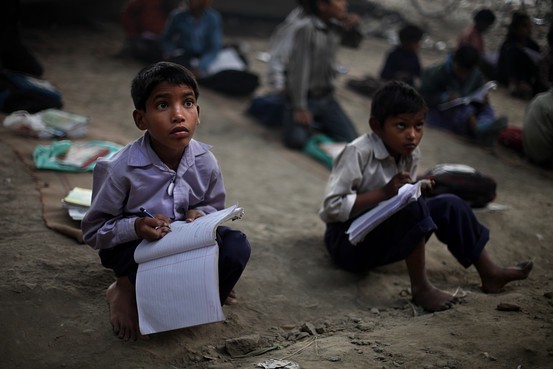If you have given your board examinations of class 12 in India, then you are certainly aware that your answer paper was not evaluated by your teachers. After the examination, the answer papers were bundled-up and distributed randomly amongst evaluators (perhaps, even in far off towns!) to reduce the likelihood of your own teacher evaluating your answers. The rationale behind this process was two fold. First — it reduced your ability to favourably influence the evaluator of your papers (because you did not have access to them), and second — it prevented your teacher’s bias towards/against you from influencing your score.
Although it is the teachers who are ultimately the ‘evaluators’, their interests as a teacher (say: “my student must score well in the board examinations!”) must be prevented from influencing the execution of their duty (objectively evaluate papers) as an ‘evaluator’. Random assignment of papers creates this possibility by not giving teachers the power to evaluate their own students’ paper. It not only relieves them of the ‘obligation’ to evaluate favourably, but also prevents any possibility of being under duress to increase scores. While the teacher is evaluating the papers, he performs the role of an ‘evaluator’, whose performance is distinctly separated and isolated from their innate interests of being a teacher. This is the concept of separation of roles, where the performance of one role (evaluator) is shielded from being influenced by the interests the person holds from other roles (such as that of the teacher).
Similarly, in the governance structure of the education system of India, same person is required to simultaneously perform the roles of ‘provider’ and ‘regulator’, without any provision to shield the interests of one role from influencing the other. Take the example of the Education Secretary, District Education Officers (DEO) and Block Education Officers (BEO).
The provision and regulation of education at the state level is under the Ministry of Education as it oversees all education related activities. The Ministry performs its duties through the executive wing, which is headed by the Secretary of Education. The Secretary is the administrative head of the Ministry, and is answerable to the Minister of Education. The Secretary has to formulate the policy for all educational activities at the state level, and thereby, is required to play the role of a ‘policy-maker’. He is also responsible for the administration of education sponsored by the state government, and thereby, plays the role of a ‘provider’. He also has to ensure that, all the providers of education (government and private) follow the policy as laid down by him, and thereby, plays the role of a ‘regulator’.
The roles of the Secretary as a ‘regulator’ and ‘provider’ are executed through the actions performed by Director of Education (DoE) and the subordinate officers. The DEOs and BEOs are the subordinate officers, and foot-soldiers of the DoE, who oversee the administration of government schools, and thereby, execute the ‘provider’ role of the Education Secretary. They are also required to ensure that the policy is adhered to by all providers (government and private), and thereby, execute the ‘regulator’ role of the Secretary.
In the execution of the role of a ‘provider’, the officers are expected to conduct the administration of government schools as per policy, by providing infrastructure, textbooks, staff, finances etc, and ensure the consistent presence of teachers in schools, and their engagement in teaching. In their execution of the role of a ‘regulator’, the officers have to inspect schools to ascertain all the provisions are met and enforce disciplinary action against the administrators of the school for the violation of policy.
Consider the situation of a policy violation by the government schools, which require the intervention by the regulators of education. The ‘regulators’ (the officers) are expected to intervene, and take necessary action against the administrators (who are also the officers!) for the policy violation by their school. Basically, the officers are required to take action against themselves! This is untenable because the details of the action taken against themselves are to be relayed to the DoE and the Secretary by the same officers.
It is worth wondering why without independent oversight, someone first take action against themselves, and then, shoot themselves in the foot by relaying to their bosses their bad job at providing education? With so much power, it would be wiser for the officers to intervene in the role of a ‘provider’ to remedy the violation, and hide the discrepancies from his bosses.
The dynamics in case of policy violations by private schools are different. The ‘regulators’ (the officers) are expected to take action against the administrators (the individual school owners). In this case, the officers, when playing the role of a ‘regulator’, are not conflicted and can take appropriate action against the school owners. This situation does not dis-incentivise the officers from reporting the violation and taking necessary action.
The same incentive structure is applicable to the Education Secretary as well. As he is responsible for the government-provided education, in order to remedy policy violations by the government schools, he would inevitably intervene in the role of a ‘provider’ and not as a ‘regulator’. It would be in his best interest to intervene and stealthily resolve the violations, rather attracting attention and causing embarrassment to his department.
The incentive structure manifests itself in the fact that only 6.4% of government schools have adhered to RTE infrastructure norms, and there is not even a single reported shutdown of a government school down for their violation. For the same violations by private schools, we see numerous reports of schools being shut down or being threatened to shut down. The education officers perform an excellent job when they are not required to take action against themselves. Therefore, like the teachers are relieved of their interests when performing the roles of an evaluator, we need to relieve the officers of the conflicting interests that arise while simultaneously executing of the roles of a provider and regulator.
Post Disclaimer
The opinions expressed in this essay are those of the authors. They do not purport to reflect the opinions or views of CCS.





